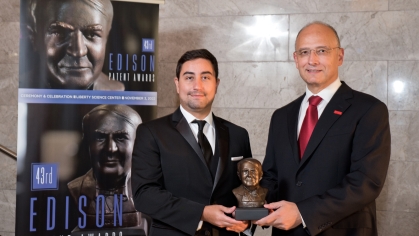SoE Among Universities Leading NSF-Funded Project to Develop Center for Smart Streetscapes

Rutgers University is one of four partner institutions, along with Florida Atlantic University, University of Central Florida, and Lehman College, in a Columbia University led team that has received a $26 million, five-year NSF award to create a new Gen-4 NSF Engineering Research Center for Smart Streetscapes (CS3).
The new CS3 will create livable, safe, and inclusive communities using advanced wireless communications technologies that promote privacy and security while incorporating community-defined feedback.
Jorge Ortiz, an assistant professor in the School of Engineering’s Department of Electrical and Computer Engineering (ECE), will serve as the institutional lead for Rutgers. His team includes ECE distinguished professor and WINLAB director Dipankar Raychaudhuri; WINLAB chief technologist Ivan Seskar; Peter Jin, an assistant professor in the Department of Civil and Environmental Engineering; and Mubbasir Kapadia, an associate professor of computer science in Rutgers School of Arts and Sciences.
“This grant allows us to develop a comprehensive research program centered around future human-streetscape interaction – interaction with intelligent agents on a large scale,” reports Ortiz.
“It will also allow us to explore the common system-related elements necessary to enable a general platform that opens the streetscape to future developers and a wider innovation pipeline. Moreover, it will bring issues of equity and ethics to the fore in the development of these technologies.”
A New Ecosystem for American Streetscapes
The more than 80% of U.S. residents who live in urban areas face increasing threats to their quality of life. Through this project, data can be harnessed for the public good from the urban streetscapes that encompass neighborhood streets, sidewalks, and public spaces.
The CS3 project will ultimately devise a new ecosystem that deploys public interest technology to recast the American streetscape as one capable in everything from guiding disabled pedestrians and sensing human behavior to amplifying emergency services and protecting people from environmental and health threats.
“Rutgers has long been deeply involved in research focused on future urban, suburban and rural streetscapes, including applications for improved open road and traffic safety, improved situational awareness, and future human-streetscape interactions,” says SoE professor and ECE chair Yingying Chen.
“And from the beginning,” she adds, “we have been a lead researcher on COSMOS -- a multi-million dollar NSF-funded proving ground for next generation wireless technologies and applications that push the limits of wireless networking,”
Rutgers’ project activities, according to Ortiz, will include data collection from the Smart Mobility Testing Ground in New Brunswick, the COSMOS testbed in Harlem, and the West Palm Beach Wireless testbed.
Drawing on Deep Expertise
Rutgers faculty will apply their expertise in wireless, edge-cloud, and future networking technologies beyond 5G, machine learning and AI in crowd modeling, traffic engineering, and human-computer interaction to develop innovative communication technologies, architectures beyond 5G, and machine learning/AI algorithms that use multimodal data streams from intersections, vehicles, and people to enable new services and novel interactions that will improve safety, efficiency – and the quality of life for citizens.
Rutgers students, too, will play a key role in the project by conducting primary research, and taking part in teaching and outreach in program-developed cross-institutional courses in streetscape technology.
A Revolutionary Exploration
For Ortiz, the project is personally impactful. “One of its goals is to enable equitable access to future technologies in future streetscapes to improve the quality of life for all citizens,” he says. “Having grown up in an inner city, I know how the lack of access to technology can negatively affect the population by widening the gap between those that benefit from innovation and those that do not. Studying novel forms of interaction that don't require personal ownership of technology is a project goal.”
By incorporating feedback from a broad spectrum of community stakeholders such as community organizations, municipalities, and K-12 schools, the researchers will be able to determine and prioritize what is most important and what concerns need to be addressed as new technologies are developed. “This is quite revolutionary in engineering and the exploration of new technology,” Ortiz adds.


